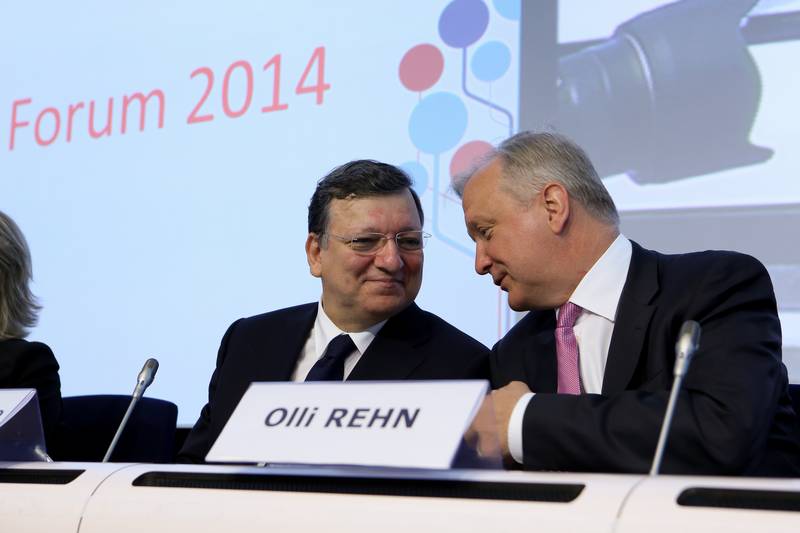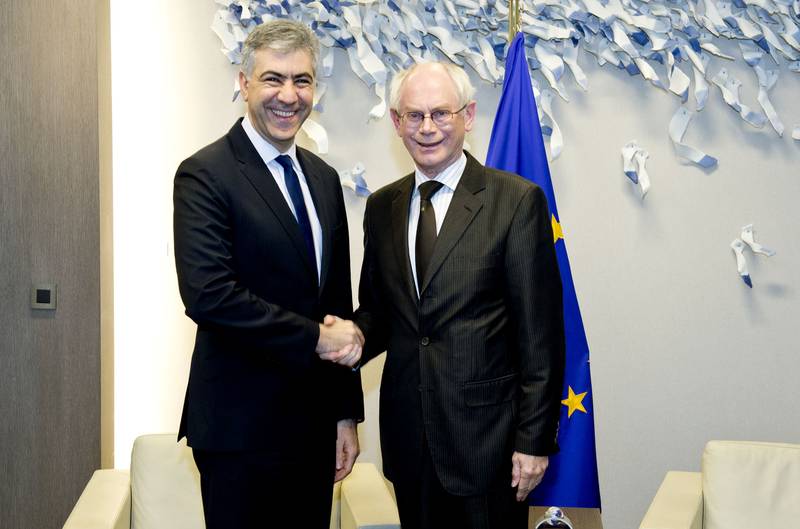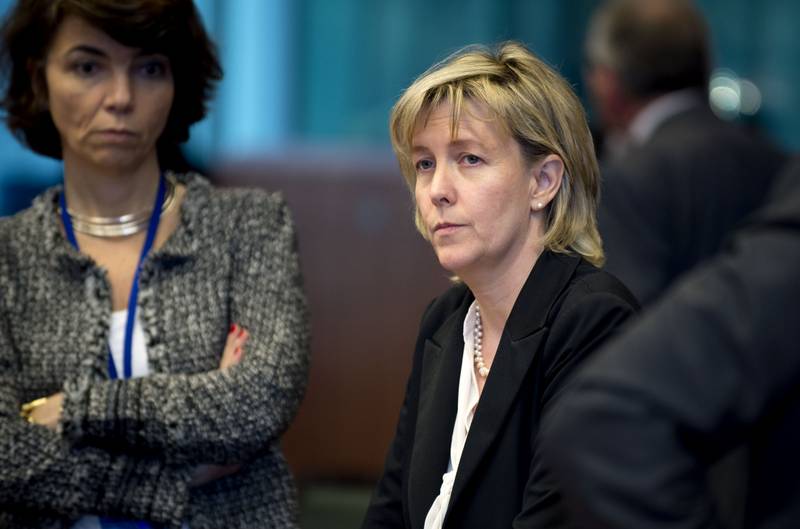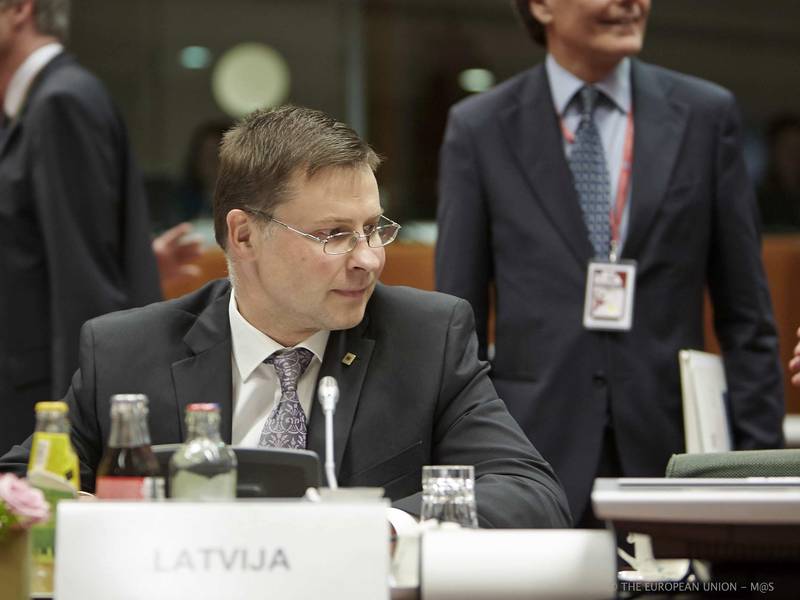Crisis in EU a Crisis of Excessive Expectations?
Adelina Marini, June 19, 2014
 The EU is again on the drawing board. This spring and the advancing summer mark the beginning of a new season of designing the Community's future. In order for the project to be good and sustainable, however, it is first necessary to make an accurate diagnose of what has happened. And this spring and summer appear to be very rich of analyses. The book hits this season have been analyses of the measures to tackle the crisis. Among the most read and discussed books are "European Spring" by Philippe Legrain, former economic adviser of European Commission President Jose Manuel Barroso, and "Stress Test: Reflections on Financial Crises" by one of the key figures during the global financial and economic crisis, Timothy Geithner, an ex-treasury secretary in Barack Obama's first government. With reflections on the lessons from the crisis in the EU was also opened this year's Brussels Economic Forum (BEF) which can be remembered with deep sincerity and clear steps for the future.
The EU is again on the drawing board. This spring and the advancing summer mark the beginning of a new season of designing the Community's future. In order for the project to be good and sustainable, however, it is first necessary to make an accurate diagnose of what has happened. And this spring and summer appear to be very rich of analyses. The book hits this season have been analyses of the measures to tackle the crisis. Among the most read and discussed books are "European Spring" by Philippe Legrain, former economic adviser of European Commission President Jose Manuel Barroso, and "Stress Test: Reflections on Financial Crises" by one of the key figures during the global financial and economic crisis, Timothy Geithner, an ex-treasury secretary in Barack Obama's first government. With reflections on the lessons from the crisis in the EU was also opened this year's Brussels Economic Forum (BEF) which can be remembered with deep sincerity and clear steps for the future.
First politics, then policies and in the end the institutions
Because of the abundant food for thought, the improved economic perspectives or because a remarkable term in the EU is ending, but this year the forum was opened and closed with very strong statements. The opening was done by Mr Barroso who is counting the last days of his presidency over the European Commission. His speech was remarkable because, apart from being something like a report on his second term, which passed entirely under the moon of the crisis and the measures to exit it, it also contained strong messages toward his successor and those who will elect him/her. Barroso again made a sharp cross-section of what has been achieved and made clear what the dangers are if there is a retreat. After his state-of-the-union speech last September, this statement can be defined as a continuation. Aside from the well known things, the accents that need to be outlined in his speech on June 10th, are a bit unusual.
In the context of the election of his successor and a new Commission at large, Barroso recalled a reform that passed somewhat unnoticed at the time - the enhancement of the portfolio of the vice president of the Commission responsible for monetary and economic policies. A post held by the Finn Olli Rehn. Mr Rehn was promoted to Barroso's special vice president who is responsible not only for the monetary and economic affairs of all the EU member states but of the euro area in particular. This was then considered a preparatory step by the Commission chief for the establishment of a finance minister post of the EU or the euro area. Barroso spent a lot of time to pay tribute to Olli Rehn and his achievements, but the very mentioning of this reform precisely and the work Mr Rehn has done is a clear message to the national leaders and his successor, whoever that might be, not to destroy what has been built already.
To Barroso, the second very big achievement of the Commission is the European Semester, which he described as the biggest transfer of powers from national to European level since the creation of the euro up to date. But why is the semester the Commission's biggest achievement according to Jose Manuel Barroso? Because it gives a big picture of the condition of the European economy at large and the national economies individually. The in-depth economic reviews, which are part of the semester, show that there is a problem with investments in the EU, especially with private investments. The question that needs to be answered by everyone in the Union in the coming years is why. The Commission analyses show that in some cases the reason is low demand expectations, in others the cost of labour is too high which damages profitability. In third cases entrepreneurs complain of bad infrastructure, mainly roads. There are also cases where the price of capital is too high.
The big challenge, he added, is political will in the member states to implement the prescribed medicine. Regarding the future, though, the order of thought should be define the politics (will this be belt-tightening, growth-stimulation or else) first, then draw specific policies (growth policy, policy to tackle unemployment or else) and only then think about a reform of the institutions. According to Barroso, in the EU there are three gaps that need to be filled to make the Union's transformation successful. The first is the governance gap. The member states no longer have what is needed to give citizens what they need. The European institutions, too, lack the appropriate equipment to do that.
Second is the legitimacy gap, because people are convinced that decisions are taken at a level which is too distant to them. And third is the expectations gap, because people very often expect more than what the political system can offer them. That is why, Barroso has recommended, precisely when there is no pressure from the markets to draw a clear horizon for deepening of the political union at least in the euro area. Otherwise, the Commission chief has warned, the Union is not insured against more turbulences when the market moods change.
How do we exit the crisis together given that we are so diverse?
Herman Van Rompuy's lecture at the closing of the forum sounded as a continuation of Barroso's analysis. He held the already traditional lecture dedicated on the great Italian economist and one of the authors of the common European currency Tommaso Padoa-Schioppa. The former prime minister of Belgium is an unusual person in the European context. He often fuelled the illusion in the past years that he is irresolute, a pawn in the member states' hands and that he cannot send his own messages but only sticks tightly to a preliminary agreed text. There are several occasions when he proved such a perception wrong and his lecture in the end of the forum in Brussels was one of them.
Mr Van Rompuy offers an impressively deep analysis of the reasons for the crisis and why precisely these decisions have been taken. Nonetheless, according to him, it is "striking and unsettling, but not surprising" that, still, there is no common understanding of what has happened and there still are important differences among intellectuals and political leaders. Obviously, this is precisely what Jose Manuel Barroso had in mind when he said that, first, an agreement must be reached on the type of politics and only then to outline policies and to reform institutions. In other words, both leaders return the European project on zero elevation. According to Herman Van Rompuy, it is these differences that should not be ignored when the crisis is discussed because very often they reflect different "cultural, historical and intellectual traditions, including respective histories of economic facts and economic thought". Unlike US, he said, who build on a shared intellectual heritage and, moreover, they share common economic history, the European historic self-understanding is diverse and remains, generally, national. And this is Herman Van Rompuy's key insight.
The European Union, its institutions and the common currency are still young. In the 1930s the European countries responded individually to the crisis unlike US. After the big crash in 1929, France remained stuck the longest to the golden standard thus playing a role in the money flow tightening globally which, for its part, contributed for the transformation of the 1929 crisis and the European banking crisis of 1931 into the Great Depression. These policy mistakes are in the foundation of France's contemporary economic thought in France. On the other hand, in Germany, the situation is so much different and the intellectual memory there is different. Germany still remembers the hyper inflation from the 1920s, caused to a large extent by the country's urgency to pay the war reparations.
The Keynesian policies from the 1930s have also left track. All this has led to a strong scepticism and a strife for discretionary economic policies and caution toward inflation. This fear, Herman Van Rompuy, said, is in the foundation of Germany's ordoliberal economic philosophy and in the way the Bundesbank works. In this sense, it is quite simplified to claim that today's crisis has ended (has it?) thanks to Mario Draghi's bold actions because his actions were only made possible by the political decisions reached by member states with completely different economic perceptions. As Herman Van Rompuy describes them, France fears deflation (which already is a fact in the euro area) and Germany fears inflation.
How much united in how much diversity?
 I deliberately started with the opening and closing remarks at BEF because the essence in the middle is only an illustration of the main conclusions of two outgoing European politicians with a huge contribution to the construction of the EU in the form we see today - Jose Manuel Barroso and Herman Van Rompuy. In my humble opinion, their roles are deeply underestimated and we are yet to realise the scale of their contribution. It is obvious, that the diversity of economic perceptions continues and is even deepening because of the huge indebtedness in many of the member states, the dangerously high unemployment rates, the uneven economic growth. We should add to that also the growing diversity of political options as the European elections have shown very clearly last month.
I deliberately started with the opening and closing remarks at BEF because the essence in the middle is only an illustration of the main conclusions of two outgoing European politicians with a huge contribution to the construction of the EU in the form we see today - Jose Manuel Barroso and Herman Van Rompuy. In my humble opinion, their roles are deeply underestimated and we are yet to realise the scale of their contribution. It is obvious, that the diversity of economic perceptions continues and is even deepening because of the huge indebtedness in many of the member states, the dangerously high unemployment rates, the uneven economic growth. We should add to that also the growing diversity of political options as the European elections have shown very clearly last month.
In all this motley mix of fears, short- and long-term needs, it is crucial to make a precise analysis, to put the right diagnosis before beginning the search of the right cure. In this sense, the first panel of BEF2014 can serve as a foundation for future discussions. The participants in the panel were very open, brief and firm in their evaluations, starting with Olli Rehn who will soon leave his European Commission post to sit in the European Parliament, through the head of the department on Europe in the IMF Reza Moghadam to Portugal's Minister of Finance Maria Luis Albaquerque and the ex-premier of Latvia Valdis Dombrovskis. All of them participants in taking crucial decisions during the past five years. Although the purpose of the panel was the draw lessons from the crisis, the four panelists outlined their views about the future as well. As you can safely bet, there was a diversity of views.
To Olli Rehn one of the lessons from the crisis is that when you are facing a financial crisis with a real risk of a bank run and therefore a risk to financial stability, you need to act forcefully to counter the panic. He quoted one of the season hits - Tim Geithner's book, where he calls this the 'Powell Doctrine'. This doctrine defends the use of excessive power following the principle "You should err on the side of doing too much than doing too little". However, Olli Rehn's main lesson is another and is not at all economic but rather a historic one. According to him, the anniversaries from 1914, 1944 and 1989 that we are marking this year should remind us that the EU is a great project of peace and prosperity whose main purpose is free Europe with democracy, rule of law, protection of civil rights and social market economy.
"Twenty-five years ago, in 1989, the great transformation began to overcome the post war division of Europe. Look at Warsaw, at Riga, at Prague and Bucharest, how they have changed. The key lesson of the past 25 years is that opportunities can be opened up with a strong commitment to structural reforms, to entrepreneurial spirit, to social fairness, and to the respect for the rule of law". With this conclusion of his Olli Rehn has outlined the big picture. Moreover, his message weighs heavily bearing in mind that before he took, may be, the most important portfolio in Barroso's second Commission, Olli Rehn was responsible for EU enlargement. In this sense, it is indicative which countries he mentioned as having done serious reforms and having completed the transformation.
Somewhat sobering after Olli Rehn's slightly romantic deviation sounded the statement of another key figure from the EU's crisis times - that of Joerg Asmussen, the former member of the ECB executive board and now a state secretary in the German social ministry. He directly put a finger in the wound saying that it was a mistake the Union to enlarge and deepen at the same time. The second big mistake was that the Economic and Monetary Union is still incomplete which was not sufficiently obvious in the economically favourable times (before the crisis). What we have now is also not sustainable, Mr Asmussen believes, because it is based on intergovernmentalism while it is necessary to focus more on the Community method. He presented five points for resolving the problems. First and foremost, relations between the euro area and the rest need to be defined because a two-speed or multi-speed Europe is not a risk but a fact. In the German self-contained style, very directly Asmussen pointed out  that there are countries which are neither desirable nor feasible to become part of the zone of the common currency, which is why their relations with the core need to be redefined.
that there are countries which are neither desirable nor feasible to become part of the zone of the common currency, which is why their relations with the core need to be redefined.
Second, the rules for euro area governance need to be consolidated and complemented by transforming all intergovernmental agreements into community ones which will require only minor treaty changes. The third point is to learn from the Ukraine experience which requires the establishment of a common energy market and development of joint defence structures. There is no single member state that can reach by itself the NATO criteria for 2% of GDP defence spending. That is why it is necessary these efforts to be combined. It is necessary to redefine relations with the EU's neighbours as well, especially the eastern ones. This should happen mainly through migration policy. Joerg Asmussen's fifth point and in his words the toughest is to find an answer to the question "How can we grow in a rapidly ageing society in Europe?". According to him, the EU leaders should not waste time and give a mandate at their December summit for work on precisely this working programme.
Although he agreed with many of Asmussen's points, Olli Rehn said the moment required to focus on specific economic reforms like the single market, better regulation and trade, while leaving the institutional reform for later, not in the first years of the new term. Olli Rehn shared the purging force of direct communication with people during his election campaign for MEP recently which changed his views to a certain extent. The Union needs a functional agenda rather than a federal one, he said.
Reza Moghadam from the IMF complemented this picture saying that Europe's big problem is the lack of fiscal governance. The lessons from how the crisis was handled are several, he said. The first is that the member states had to build much stronger fiscal positions before the crisis because during the crisis public finances deteriorated dramatically. The public debt to GDP ratio in the euro area soared on average by 30 percentage points which is mainly due to automatic stabilisers and the bailout of the banking sector. The second lesson is that too much attention is paid on nominal instead of structural targets. An issue that was attempted to be corrected in the fiscal compact. The biggest problem, though, is that enforcement is weak. The limit of 3% of the nominal budget deficit of GDP has not prevented the member states to spend more. No sanctions have been applied.
The third mistake is that the design of the fiscal rules does not allow for flexibility and the fourth is that aside from the fiscal governance there is a need for good economic governance as well. Reza Moghadam's recommendations are for simplification of rules and more flexibility. Something Olli Rehn disagreed with because, in his opinion, if rules are simplified too much it will be hard to avoid them become pro-cyclical. Something like a paradox, he explained, the more you take into account the cycle the more complex rules become, that is why now what is important is to implement. It will be really interesting to see what functions Olli Rehn will receive in the European Parliament.
Portugal's Finance Minister tried to make the discussion not so abstract and expert. Maria Luis Albaquerque demonstrated a surprising overlap with her fellow countryman Jose Manuel Barroso's views. According to her, the problems Portugal has are not alien to many other member states. The challenges are common for all - ageing populations, lost competitiveness, need for structural reforms to open the economy, integration with the single market. A more specific problem for Portugal is that it is a peripheral country which can be felt very well through energy. The lack of a single energy market leads to high prices of energy resources. Financial fragmentation, in spite of the efforts to build the banking union, too, is a big challenge. One of the main lessons from the crisis to Ms Albaquerque is the weak European institutional framework and ignoring the common European rules. The price of ignoring the signals is huge.
She has warned that it would be naive to delude ourselves that the crisis is over only because the markets are in a better mood. About market moods spoke also Mr Barroso in his speech. With the first change of moods, the markets will claim what is theirs, she added. The biggest challenge, according to her, are people's high expectations. If you remember, Barroso spoke of too high expectations as one of the gaps the EU needs to fill in order to succeed. Ms Albaquerque mentioned the same term - expectations gap - pointing out that politicians need to make people understand what is realistic and what not, especially in the context of ageing, globalisation, loss of competitiveness. "We need to start this openly because otherwise we will face very severe political problems. Some of the expectations may simply be not realistic anymore", she concluded.
The key is implementation
 Very appropriate was the decision Valdis Dombrovskis to take part in the first panel. Firstly because the ex-premier's country went through a very deep, but astonishingly short crisis. Currently Latvia is one of the few member countries with dynamic economic growth (around 4%). Second, because since the beginning of the year the country has become the 18th member of the euro area. Mr Dombrovskis, who was on the informal list of candidates of the Council for the European Commission presidential post, noted that the most important thing in overcoming the Latvian crisis was the fast implementation of adjustment measures. He made a parallel with Greece saying that last year Greece managed to overtake two Latvian records - for GDP decline and size of fiscal correction. The big difference, however, is that Latvia did not postpone the painful measures. Postponing painful measures does not reduce the pain, on the contrary, the former prime minister explained.
Very appropriate was the decision Valdis Dombrovskis to take part in the first panel. Firstly because the ex-premier's country went through a very deep, but astonishingly short crisis. Currently Latvia is one of the few member countries with dynamic economic growth (around 4%). Second, because since the beginning of the year the country has become the 18th member of the euro area. Mr Dombrovskis, who was on the informal list of candidates of the Council for the European Commission presidential post, noted that the most important thing in overcoming the Latvian crisis was the fast implementation of adjustment measures. He made a parallel with Greece saying that last year Greece managed to overtake two Latvian records - for GDP decline and size of fiscal correction. The big difference, however, is that Latvia did not postpone the painful measures. Postponing painful measures does not reduce the pain, on the contrary, the former prime minister explained.
The risk he sees at the moment is the too slow economic growth or rather the EU's japanisation. According to him, this is a central issue and the key to resolving it is competitiveness. This should become a major priority, especially in the context of a rapidly changing world. The solutions, he said, are not new, they only need to be implemented in practise and not stay on paper. Those are enhancing the internal market, especially in the areas of services and energy, creating a digital market in the EU. Red tape should be reduced, more investment is needed in research and innovation, facilitate international trade and sign trade agreements with US and Japan. Overall, he said, there is no panacea but implementing the already agreed things, as well as implementing reforms in the member states will change the situation from stagnation to sustainable growth.
Read, write and do not haste!
There is hardly a person in the EU who does not realise that the Union needs reforms. First and foremost, however, an agreement needs to be reached about the diagnosis. That is why it is important to read all the new analyses, to do new ones and to debate until a common conclusion is reached. Only then, following Barroso's steps, we should move toward agreeing the right reform. The deadline Joerg Asmussen set - December - is realistic if leaders stop dealing with the much less significant issue who should be the next European Commission president and begin dealing with the much more important questions what path the EU should follow, with whom and under what conditions. And, yes, do not forget to implement what has already been agreed!
 Klaus Regling | © Council of the EU
Klaus Regling | © Council of the EU Mario Centeno | © Council of the EU
Mario Centeno | © Council of the EU Mario Centeno | © Council of the EU
Mario Centeno | © Council of the EU